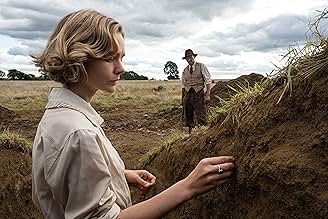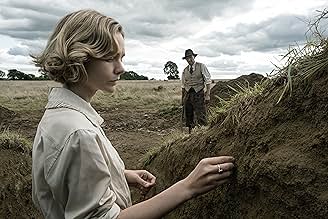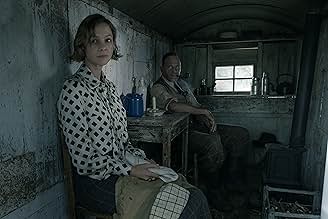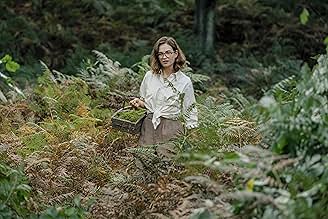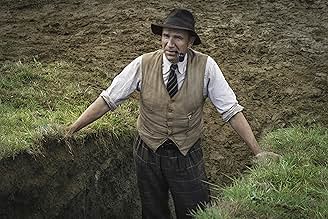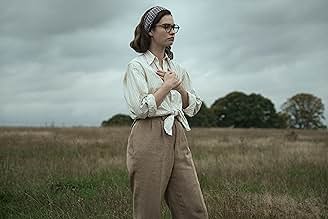À la veille de la Seconde Guerre mondiale, une riche veuve recrute un archéologue amateur pour fouiller les monticules funéraires disséminés sur sa propriété.À la veille de la Seconde Guerre mondiale, une riche veuve recrute un archéologue amateur pour fouiller les monticules funéraires disséminés sur sa propriété.À la veille de la Seconde Guerre mondiale, une riche veuve recrute un archéologue amateur pour fouiller les monticules funéraires disséminés sur sa propriété.
- Réalisation
- Scénario
- Casting principal
- Nomination aux 5 BAFTA Awards
- 3 victoires et 11 nominations au total
Avis à la une
The Dig (2021) was directed by Simon Stone. It stars Carey Mulligan as Edith Pretty. Mrs. Pretty is a widow who lives on a large estate. She is convinced that there's something of archeological significance on her property. She employ Basil Brown (Ralph Fiennes) to excavate one of the burial mounds. Brown is a skilled and experienced excavator, but he has no formal academic training. The result of his efforts can now be seen in the British Museum.
This could have been a great movie, if director Stone had just worked with what actually happened. Naturally, staff of the local museum wanted to direct the excavation, as did staff of the British museum. There was an inquest to decide the ownership of the find. World War II was (literally) about to begin. A perfect 90-minute movie. However, it ended up being a less-than-perfect 105 minute movie.
That's because director Stone brings in a (fictitious) cousin of Mrs. Pretty and a beautiful young female archeologist married to a stodgy , unromantic male archeologist. (Guess where that goes?) The inquest--an absolutely essential scene about who owns the find--is botched. You have to work backwards to figure out what happened. Worst of all, you never see the dramatic results of the excavation. You can see them in the British Museum, or online, or on a postcard. However, you don't see them in the movie. (Maybe the British Museum didn't like the movie, and refused to give permission.)
All in all, what could have been an excellent movie turned out to be pretty good movie. It's worth seeing as long as you don't expect great things. It works well on the small screen. The Dig has a pretty good rating of 7.3. I agreed, and rated it 7.
This could have been a great movie, if director Stone had just worked with what actually happened. Naturally, staff of the local museum wanted to direct the excavation, as did staff of the British museum. There was an inquest to decide the ownership of the find. World War II was (literally) about to begin. A perfect 90-minute movie. However, it ended up being a less-than-perfect 105 minute movie.
That's because director Stone brings in a (fictitious) cousin of Mrs. Pretty and a beautiful young female archeologist married to a stodgy , unromantic male archeologist. (Guess where that goes?) The inquest--an absolutely essential scene about who owns the find--is botched. You have to work backwards to figure out what happened. Worst of all, you never see the dramatic results of the excavation. You can see them in the British Museum, or online, or on a postcard. However, you don't see them in the movie. (Maybe the British Museum didn't like the movie, and refused to give permission.)
All in all, what could have been an excellent movie turned out to be pretty good movie. It's worth seeing as long as you don't expect great things. It works well on the small screen. The Dig has a pretty good rating of 7.3. I agreed, and rated it 7.
An intriguing little piece of British history, The Dig tells a slow-burning story with understated and genuine drama throughout, turning what could have been a rather dry tale of archaeology into a genuinely gripping character drama. Its historical context takes a little while to become fully relevant, but ultimately, The Dig really proves itself as a captivating watch.
One of the things that I really liked about The Dig was its patience. Never dragging yet never rushing, the film takes its time to build up all of its main strengths, from its characters, their emotional back stories, and the overarching historical context of the outbreak of World War II.
Complete with elegant camerawork, a beautiful score and impressively atmospheric direction that makes it an eye-catching watch from the first few moments, The Dig has enough confidence and depth to keep you engrossed even if its story isn't advancing apace, something that's a lot harder to pull off than you may think.
One of the big reasons that the film's patient pacing and style work so well is because of its understated, genuine drama. With calm yet fully convincing performances across the board, particularly from Ralph Fiennes and Carey Mulligan, this isn't a showy period drama by any means, but eases you into a story about real people, making them the centre of attention far more than the historical significance of the event.
I'm not particularly well-versed in archaeology, and I didn't know about this discovery before watching this film. I think that might be the case for many other people, but the great thing about The Dig is that it's primarily a character-driven drama, and one that uses emotional intrigue to bring you closer to the story at hand and allow you to appreciate its importance.
One element where the film does seem to falter is in its use of the historical backdrop of the lead-up to World War II. Set in the summer months of 1939 before the outbreak of war, there are sporadic references to the coming conflict through the first two acts of the movie, but they don't seem to bear much relevance to this story about an archaeological find.
However, the film slowly begins to unveil how the historical context plays into its characters' personal lives and the fate of the dig itself, with dramatic focus shifting significantly in the final act, but just at the right point that the sudden arrival of the war into everyday life feels just like what it would have been like to experience it first-hand, taking over everything seemingly normal in an instant.
As a result, while the historical backdrop seems almost contrived at first, it really comes good as the film progresses, another demonstration of how the patience of The Dig really plays into its hands throughout.
One of the things that I really liked about The Dig was its patience. Never dragging yet never rushing, the film takes its time to build up all of its main strengths, from its characters, their emotional back stories, and the overarching historical context of the outbreak of World War II.
Complete with elegant camerawork, a beautiful score and impressively atmospheric direction that makes it an eye-catching watch from the first few moments, The Dig has enough confidence and depth to keep you engrossed even if its story isn't advancing apace, something that's a lot harder to pull off than you may think.
One of the big reasons that the film's patient pacing and style work so well is because of its understated, genuine drama. With calm yet fully convincing performances across the board, particularly from Ralph Fiennes and Carey Mulligan, this isn't a showy period drama by any means, but eases you into a story about real people, making them the centre of attention far more than the historical significance of the event.
I'm not particularly well-versed in archaeology, and I didn't know about this discovery before watching this film. I think that might be the case for many other people, but the great thing about The Dig is that it's primarily a character-driven drama, and one that uses emotional intrigue to bring you closer to the story at hand and allow you to appreciate its importance.
One element where the film does seem to falter is in its use of the historical backdrop of the lead-up to World War II. Set in the summer months of 1939 before the outbreak of war, there are sporadic references to the coming conflict through the first two acts of the movie, but they don't seem to bear much relevance to this story about an archaeological find.
However, the film slowly begins to unveil how the historical context plays into its characters' personal lives and the fate of the dig itself, with dramatic focus shifting significantly in the final act, but just at the right point that the sudden arrival of the war into everyday life feels just like what it would have been like to experience it first-hand, taking over everything seemingly normal in an instant.
As a result, while the historical backdrop seems almost contrived at first, it really comes good as the film progresses, another demonstration of how the patience of The Dig really plays into its hands throughout.
'The Dig' is a beautifully photographed period film (circa 1939, Suffolk, Great Britain) that seemed a lock to garner first Oscars for Ralph Fiennes (*overdue) and Cinematographer Mike Eley. Therefore, I'm instituting the 1st Annual "Oscar Snub Award" to the film most undeservedly left out of nominations. This year it was a no brainer - 'The Dig' wins and it wasn't close. So on with my original review B. S. ("Before Snub")...
Metaphors supporting Themes abound in 'The Dig' - "life is fleeting", "the search for meaning in our lives", "our relevance in History", and "is this all there is". Classic themes for dramas that are the eternal questions within our lives. The film intertwines those themes within the central characters, each conducting their own search for answers.
The framework of the story occurs on the eve of WWII for Great Britain. The impending gravity of such hovers over the film, intensifying the characters' emotions and urgency in searching for answers to such questions - the telescope and magnifying glass used within the story serve as metaphors to that end. Collapsing walls of the dig site that almost takes Basil Brown's life illustrate the tenuous fragility of life which could end in a moment of randomness. There are many more such examples in 'The Dig'.
Such poetic filmmaking takes painstaking attention to detail in production to pull off at the level achieved in this film. Utilizing the beautiful cinematography of Mike Eley and deft touch of Film Editor Jon Harris, Director Simon Stone succeeds in elevating the The Dig to an elite level of film art.
This is without question the Best Picture of the Year, and I am thankful this beautiful film came in at the last possible minute to save an otherwise (and understandable) blah year in the film industry.
Director Simon Stone's Oscar nomination for both Director and Best Picture is a virtual certainty.
Ralph Fiennes (Basil Brown) never misses (except taking home an Oscar), but I predict he will FINALLY* be recognized by Academy members en masse for his best of the year acting in this film, along with Mike Eley for Cinematography.
Carey Mulligan (Edith Pretty) should be nominated except she has two Oscar worthy films, both with a deserved good chance to take home an Oscar. Her spotlight lead part in 'A Promising Young Woman' has much more Oscar potential which will negate her role in The Dig - Mulligan should get Actress of the Year for putting forth two such great performances in one year!
At the end of the night (Oscar night), 'The Dig' could sweep up wins in the aforementioned major Oscar categories for 2020 - I certainly wouldn't bet against it happening (EDIT: Boy was I wrong 😑), and In terms of total Oscar nominations, this film sets up as the front contender for 2020. Then again, it could be a dodgy awards year - competition of last minute entries (is it going to get to the point where releases occur the day before the voting deadline?), and above-the-norm "agendas" abound in the industry these days [EDIT: Boy, was I correct about this (I am sorry to say)].
While the ensemble cast is highly competent, I don't see a particular supporting role having enough "spotlight momentum" to break-out and win an Oscar, although Lily James (Peggy Piggott) is a long-shot.
If there was one weak point in the film, it would be the digression to the character Peggy that seems to be thinly integrated into the film. This hole in the film likely comes from Editing decisions, and will probably cost Lily James, Jon Harris (Editing), and Stone and co-writer Moira Buffini (Adapted Screenplay) Oscar nominations.
The film runs under 2 hours, and it would have only required adding another 5-10 minutes to fully integrate Peggy into the story - Peggy is at a crossroads in her young life and her marriage to a man not interested in women forecasts a gloomy future - She gets sage advice from Edith Pretty (Mulligan) on seizing the day (and not to make the same mistakes she made).
My advice to Stone is "Don't start something without completing it". My guess is there is extra footage on Peggy and perhaps a Director's-Cut extended version will be released at some point completing Peggy's story - I'd like to see that.
👍👍 to all involved in 'The Dig' - the film is a treat for the eyes - the acting superior - production execution excellent - it is 2020's Best Picture by classic film making standards, despite being the biggest Oscar snub of the 2021 Academy Awards.
Here's hoping "agendas" and politics are left out of recognizing the best in film arts. (EDIT: Clearly agendas were NOT left out based on nominations MIA🙁)
* Ralph Fiennes sits atop my IMDb list of 'Best Actors Without An Oscar' (EDIT: and will continue to be atop the list for at least one more year - Note: At least Glen Close has a shot at graduating off my no-Oscar list 🤞)
Metaphors supporting Themes abound in 'The Dig' - "life is fleeting", "the search for meaning in our lives", "our relevance in History", and "is this all there is". Classic themes for dramas that are the eternal questions within our lives. The film intertwines those themes within the central characters, each conducting their own search for answers.
The framework of the story occurs on the eve of WWII for Great Britain. The impending gravity of such hovers over the film, intensifying the characters' emotions and urgency in searching for answers to such questions - the telescope and magnifying glass used within the story serve as metaphors to that end. Collapsing walls of the dig site that almost takes Basil Brown's life illustrate the tenuous fragility of life which could end in a moment of randomness. There are many more such examples in 'The Dig'.
Such poetic filmmaking takes painstaking attention to detail in production to pull off at the level achieved in this film. Utilizing the beautiful cinematography of Mike Eley and deft touch of Film Editor Jon Harris, Director Simon Stone succeeds in elevating the The Dig to an elite level of film art.
This is without question the Best Picture of the Year, and I am thankful this beautiful film came in at the last possible minute to save an otherwise (and understandable) blah year in the film industry.
Director Simon Stone's Oscar nomination for both Director and Best Picture is a virtual certainty.
Ralph Fiennes (Basil Brown) never misses (except taking home an Oscar), but I predict he will FINALLY* be recognized by Academy members en masse for his best of the year acting in this film, along with Mike Eley for Cinematography.
Carey Mulligan (Edith Pretty) should be nominated except she has two Oscar worthy films, both with a deserved good chance to take home an Oscar. Her spotlight lead part in 'A Promising Young Woman' has much more Oscar potential which will negate her role in The Dig - Mulligan should get Actress of the Year for putting forth two such great performances in one year!
At the end of the night (Oscar night), 'The Dig' could sweep up wins in the aforementioned major Oscar categories for 2020 - I certainly wouldn't bet against it happening (EDIT: Boy was I wrong 😑), and In terms of total Oscar nominations, this film sets up as the front contender for 2020. Then again, it could be a dodgy awards year - competition of last minute entries (is it going to get to the point where releases occur the day before the voting deadline?), and above-the-norm "agendas" abound in the industry these days [EDIT: Boy, was I correct about this (I am sorry to say)].
While the ensemble cast is highly competent, I don't see a particular supporting role having enough "spotlight momentum" to break-out and win an Oscar, although Lily James (Peggy Piggott) is a long-shot.
If there was one weak point in the film, it would be the digression to the character Peggy that seems to be thinly integrated into the film. This hole in the film likely comes from Editing decisions, and will probably cost Lily James, Jon Harris (Editing), and Stone and co-writer Moira Buffini (Adapted Screenplay) Oscar nominations.
The film runs under 2 hours, and it would have only required adding another 5-10 minutes to fully integrate Peggy into the story - Peggy is at a crossroads in her young life and her marriage to a man not interested in women forecasts a gloomy future - She gets sage advice from Edith Pretty (Mulligan) on seizing the day (and not to make the same mistakes she made).
My advice to Stone is "Don't start something without completing it". My guess is there is extra footage on Peggy and perhaps a Director's-Cut extended version will be released at some point completing Peggy's story - I'd like to see that.
👍👍 to all involved in 'The Dig' - the film is a treat for the eyes - the acting superior - production execution excellent - it is 2020's Best Picture by classic film making standards, despite being the biggest Oscar snub of the 2021 Academy Awards.
Here's hoping "agendas" and politics are left out of recognizing the best in film arts. (EDIT: Clearly agendas were NOT left out based on nominations MIA🙁)
* Ralph Fiennes sits atop my IMDb list of 'Best Actors Without An Oscar' (EDIT: and will continue to be atop the list for at least one more year - Note: At least Glen Close has a shot at graduating off my no-Oscar list 🤞)
I was excited to see a film that portrays 1930's England, and Ralph Fiennes and Carey Mulligan are proven actors that bring a unique presence to their films. Archeology might be a tough sell for the premise of a film and it was these actors that drew me in. The first half gets it so right, it's just about the time period and characters digging while becoming excited as they unearth the past, it's rather simple yet these actors have no trouble keeping you interested. In fact it was refreshing to see English people presented on screen becoming excited over finding evidence of their ancestors and past to this ancient land given the current hostile attitude towards the English and Celtic peoples by particular political groups and media companies who like to remind us we have little culture and heritage.
Then suddenly it's as if the writers thought viewers would become bored and in comes a new character, a rather modern-behaving "liberated" female with her controlling husband, inserted into the plot to remind us how women should really behave in the current age as if we needed reminding. The key characters become background noise, and you have this love triangle develop, the film takes on a different purpose, I'd rather see more character development between the man who discovered the relics and the museum trying to take credit from the little man.
Then suddenly it's as if the writers thought viewers would become bored and in comes a new character, a rather modern-behaving "liberated" female with her controlling husband, inserted into the plot to remind us how women should really behave in the current age as if we needed reminding. The key characters become background noise, and you have this love triangle develop, the film takes on a different purpose, I'd rather see more character development between the man who discovered the relics and the museum trying to take credit from the little man.
"The Dig" (2021 release from the UK; 112 min.) reminds us at the very beginning that this is "Based On a True Story". We then go to "Suffolk, England, 1939" as Basil Brown arrives at the house of Edith Pretty. Turns out Mrs. Pretty has hired Mr. Brown to do some archeological work on her estate. Her young son excitedly asks Mr. Brown "Are you going to dig upo the mountain?". Mr. Brown, taking room and pension at Mrs. Ptretty's house, starts to dig and soon is working his way towards some intriguing finds... At this point we are 15 min. into the movie, but to tell you more of the plot would spoil your viewing experience, you'll just have to see for yourself how it all plays out.
Couple of comments: this is directed by little known Australian director Simon Stone ("The Daughter)". Here he brings us a historical drama about what later became known as the Sutton Hoo treasure, one of the biggest archeological finds in British history. The setting of 1939 is pivotal in several ways: of course the threat of WWII is in the air, but even more important, the way of life in those days was just entirely different, and being in a remote English area (near Ipswich) only reinfornces that. So be prepated for a slow moving film, I didn't mind it one bit. Even more critical for the movie is Carey Mulligan's exquisite lead performance. Playing a person who is more than 20 years her senior in real life (Carey is 35, Mrs, Pretty was in her mid-50s in 1939), she does so with grace and style and presence. The role couldn't be more different from what Carey did in the recently released "Promising Young Woman", which was in my top 3 of the bests films of 2020. Ralph Fiennes is equally great as the excavator Mr. Brown. Last but not least there is a wonderful orchestral score by Stefan Gregory, who I must admit was previously unknown to me.
"The Dig" opened last weekend in select theaters for a short run before then moving on to Netflix. (Seems like every other new theatrical release these days follows that pattern....) Thankfully the film opened at my art-house theater here in Cincinnati. The early Satruday evening screening where I saw this at was attended so-so (exactly 5 people including myself). Never mind. If you are in the mood for a good ol' fashioned hisstorical drama featuring outstanding performances from Carey Mulligan and Ralph Fiennes, I'd readily suggest you check this out, be it in the theater (if you still can), on VOD< or eventually on DVD/Blu-ray, and draw your own conclusion.
Couple of comments: this is directed by little known Australian director Simon Stone ("The Daughter)". Here he brings us a historical drama about what later became known as the Sutton Hoo treasure, one of the biggest archeological finds in British history. The setting of 1939 is pivotal in several ways: of course the threat of WWII is in the air, but even more important, the way of life in those days was just entirely different, and being in a remote English area (near Ipswich) only reinfornces that. So be prepated for a slow moving film, I didn't mind it one bit. Even more critical for the movie is Carey Mulligan's exquisite lead performance. Playing a person who is more than 20 years her senior in real life (Carey is 35, Mrs, Pretty was in her mid-50s in 1939), she does so with grace and style and presence. The role couldn't be more different from what Carey did in the recently released "Promising Young Woman", which was in my top 3 of the bests films of 2020. Ralph Fiennes is equally great as the excavator Mr. Brown. Last but not least there is a wonderful orchestral score by Stefan Gregory, who I must admit was previously unknown to me.
"The Dig" opened last weekend in select theaters for a short run before then moving on to Netflix. (Seems like every other new theatrical release these days follows that pattern....) Thankfully the film opened at my art-house theater here in Cincinnati. The early Satruday evening screening where I saw this at was attended so-so (exactly 5 people including myself). Never mind. If you are in the mood for a good ol' fashioned hisstorical drama featuring outstanding performances from Carey Mulligan and Ralph Fiennes, I'd readily suggest you check this out, be it in the theater (if you still can), on VOD< or eventually on DVD/Blu-ray, and draw your own conclusion.
Le saviez-vous
- AnecdotesReimagines the events of the 1939 excavation of Sutton Hoo near Woodbridge, in Suffolk, England. It is the site of two early medieval cemeteries that date from the 6th to 7th centuries. One cemetery had an undisturbed ship burial with a wealth of Anglo-Saxon artifacts. Most of these objects are now held by the British Museum.
- GaffesEdith's son Robert can be seen wearing an aluminium foil hat early in the movie, Aluminium foil did not surface until after the war, but tin foil had existed since the 19th century.
- Citations
Basil Brown: Robert, we all fail. Every day. There are some things we just can't succeed at no matter how hard we try. I know it's not what you want to hear.
- ConnexionsFeatured in Jeremy Vine: Épisode #4.25 (2021)
- Bandes originalesLa Rejouissance (Allegro)
Written by George Frideric Handel
Public Domain
Arranged by Julian Kershaw
Performed by Alder Valley Brass
Meilleurs choix
Connectez-vous pour évaluer et suivre la liste de favoris afin de recevoir des recommandations personnalisées
- How long is The Dig?Alimenté par Alexa
Détails
- Date de sortie
- Pays d’origine
- Site officiel
- Langue
- Aussi connu sous le nom de
- La excavación
- Lieux de tournage
- Sociétés de production
- Voir plus de crédits d'entreprise sur IMDbPro
Box-office
- Montant brut mondial
- 693 $US
- Durée1 heure 52 minutes
- Couleur
- Mixage
- Rapport de forme
- 2.00 : 1
Contribuer à cette page
Suggérer une modification ou ajouter du contenu manquant







